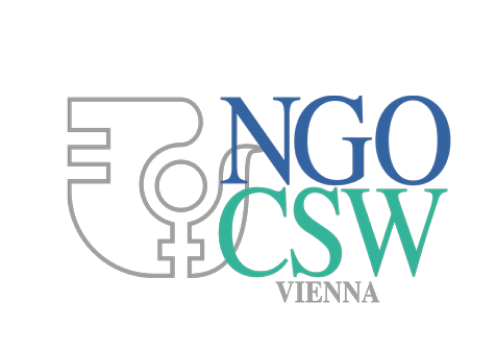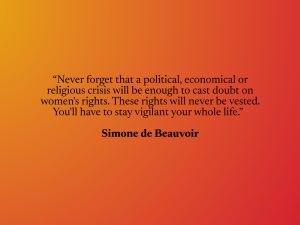Social protection systems, access to public services and sustainable infrastructure for gender equality and the empowerment of women and girls
The Federation of American Women’s Clubs Overseas and the undersigned non-governmental organizations in consultative status with the United Nations Economic and Social Council (ECOSOC), members of the NGO Committees on the Status of Women Vienna and Geneva, present the following statement to the members and observers of the 63rd United Nations Commission on the Status of Women:
Social protection is a key human rights-based strategy for eradicating poverty and increasing equality and social justice to achieve the 2030 Agenda for Sustainable Development. The International Labor Organization (ILO) estimates that over 70 percent of the world’s population, more than five billion people, mostly women, are not covered by comprehensive social security systems.
Article 22 of the Universal Declaration of Human Rights asserts that “every member of society has the right to social security.” Sustainable Development Goal (SDG) #1, “end poverty in all its forms everywhere,” calls for nationally Internappropriate social protection systems and measures for all by 2030. The ILO’s Social Protection Floors Recommendation (2012) called for governments to establish social protections for all in need, and the International Covenant on Economic, Social and Cultural Rights (1976) committed its parties to work toward granting an adequate standard of living.
Gender-sensitive social protection measures require the recognition of women’s and girls’ needs and priorities, as well as their time and energy constraints. The links between accessible quality public services, education, health systems and infrastructure and the empowerment of women and girls are clear, and essential for achieving SDG #5, “achieve gender equality and empower all women and girls.” Social protection systems, public services and infrastructure programs should be based on thorough needs assessments which recognize the variety of women’s roles.
Women and girls do a disproportionate share of unpaid and low-paid work, and experience time poverty. This restricts their access to education and decent
work, negatively impacts their health and well-being, limits their opportunities and undervalues their contributions. Access to infrastructure and public services benefits women and girls by decreasing the burdens of unpaid and low paid work, enabling them to devote more time to education and income-generating activities, and improve their livelihoods, which in turn will benefit families and communities. Infrastructure investments designed to loosen traditional gender roles and social norms accelerate women’s economic empowerment.
Unconditional universal social protection would avoid stigmatization, promote inclusion and equality, and reduce gender stereotypes. Economic empowerment for women and girls will require transformations in the systemic policies and stereotypes which disadvantage women in the family, community and labor market: unpaid and underpaid work and the gender pay gap, and the lack of income security for older women and widows.
The provision of public services should never be considered an opportunity for profit-making. Empowered educated citizens and responsible governments – not market systems – should create inclusive societies based on rules to safeguard human liberty, equality and dignity.
Women create, nurture and sustain communities and maintain ecological systems. Gender-sensitive social protection systems, public services and infrastructure programs will broaden community networks, connect women with new opportunities, and strengthen social inclusion and the collective action necessary to achieve the ambitious and inclusive goals of the 2030 Agenda.
The undersigned members of the NGO Committee on the Status of Women Vienna submit the following recommendations for consideration by the members and observers of the 63rd Commission on the Status of Women, and call upon Member States to:
– Provide unconditional, universal social protection to all in all stages of the life cycle, and implement policy frameworks to meet basic needs for all, especially migrant and refugee women and girls, people with disabilities, the elderly, and widows;
– Adopt policies to narrow gender pay gaps, enhance women’s access to income and pensions, and provide family allowances for children;
– Provide comprehensive health services which address gender-specific risks and needs, including sexual and reproductive health services for girls
and women, child and maternity services, mental health services, and care for survivors of gender-based violence;
– Involve women and women’s organizations in the definition of essential services for priority public funding, and support women’s participation in in- frastructure development planning and decision-making;
– Analyse women’s specific needs and constraints, and address these through gender-sensitive infrastructure programs and policies;
– Design innovative gender-inclusive infrastructure projects to ensure women’s security in all public spaces and on public transportation;
– Mitigate the environmental impacts of infrastructure developments including roads, water, transport;
– Involve women and women’s organizations in participatory monitoring mechanisms such as social audits to improve the design and delivery of gender-responsive programs;
– Increase support for women’s NGOs and involve civil society, especially women and women’s organizations in the design, delivery, monitoring and evaluation of social protection, public services and infrastructure developments.
Undersigned member organizations of NGO Committee on the Status of Women Vienna:
European Union of Women
Federation of American Women’s Clubs Overseas (FAWCO) Global Fund for Women
Graduate Women International
International Alliance of Women
International Association of Democratic Lawyers International Council of Women
International Federation on Ageing
International Federation for Home Economics (IFHE)
Le Projet Imagine
Make Mothers Matter (MMM)
Mother Legacy Project
Pax Romana
Servas International
Socialist International Women
Society for the Advancement of Global Understanding Soroptimist International
Widows for Peace through Democracy
Women’s International Zionist Organization (WIZO) World Federation of Ukrainian Women’s Organizations World Union for Progressive Judaism
Zonta International






